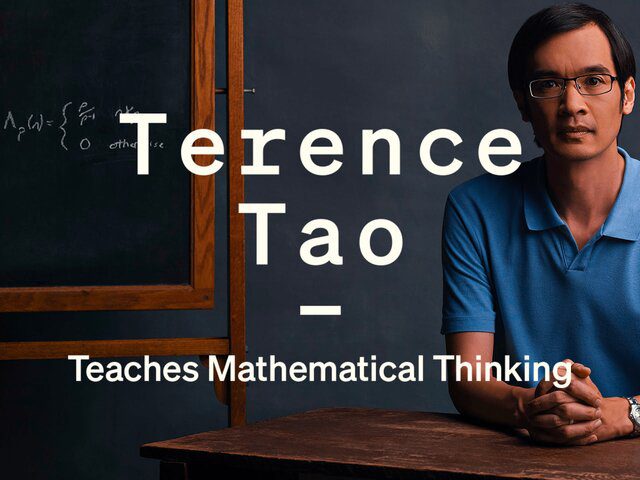For the groundbreaking mathematician, logical thinking goes beyond theorems and solutions—it’s the key to changing minds and, in some cases, saving lives.
Terence Tao loves a tough problem—the kind that makes you sweat. His work in number theory ¹ and quantum mechanics has solidified his reputation as one of the most powerful minds on the planet, all while opening countless eyes to the beauty, artistry, and universal relevance of mathematical thinking.
An expert is a man who has made all the mistakes which can be made, in a narrow field. – Niels Bohr
Mathematical thinking is actually an extension of ordinary everyday thinking. It’s not magic.
It’s okay to fail! Failing is how you learn to approach problems differently, and find creative solutions.
Early Bloomer
Born and raised in Adelaide, Australia, Terence found an early mentor in his mother, a high school math teacher. By the age of seven, Terence was learning calculus; by nine, he was taking it at the university level. Within a few years, he was competing in international mathematics competitions.
- At age 2 taught himself read and do basic arithmetic
- At age 8 scored 760 out of 800 on the math portion of the standardized test known as the SAT, which is usually administered to high school students
- At age 10, he became the youngest person in history to win a medal in the International Mathematical Olympiad
- At age 15, he was commissioned to write a training book for secondary school math teachers on algebra, euclidean geometry, and analytic geometry.
- At age 20 , he earned a Ph.D. from New Jersey’s Princeton University
- At age 24, he became one of the youngest tenured professors at UCLA
- At age 28, he coauthored the Green-Tao theorem, a masterstroke in the field of number theory
- At age 31, he was made a MacArthur Fellow
- At age 43, he was named a “Great Immigrant” by the Carnegie Corporation, a premier philanthropic fund that each year honors an elite number of naturalized Americans.
- At age 46, he was enlisted by U.S. President Joe Biden to serve on the President’s Council of Advisors on Science and Technology.
Terence went on to earn his Ph.D. from Princeton University in New Jersey and join the faculty at the University of California, Los Angeles (UCLA). At the age of twenty-four he was promoted to full professorship, a role he continues to hold.
He has received the Fields Medal, the highest prize that mathematics has to offer; a MacArthur Fellowship, also known as a “genius grant”; and a Royal Medal from the U.K.’s Royal Society, the oldest continuously running scientific academy in the world.
He’s also authored or coauthored more than three hundred research papers that have been cited more than eighty three thousand times, and he’s published more than a dozen books.
Prime Time
Terence is particularly renowned for his work on prime numbers.
For Terence, prime numbers are endlessly fascinating. These are whole numbers larger than one that can be divided evenly by only themselves and one. (Think: 2, 3, 5, 7, and 11.) Primes are considered number theory’s fundamental building blocks, but they are enigmatic: Mathematicians don’t exactly understand why they show up where they do. Sometimes pairs of primes, or so-called “twin primes,” appear just two numbers apart, like 5 and 7.
In collaboration with the British mathematician Ben Green of the University of Oxford in Oxford, England, Terence found that, no matter how long of a string of primes (like 3, 7, and 11) with a constant gap (in this case, a distance of four) between them, there would always be a string that’s longer. Their proof stands among the most significant discoveries since the Greek mathematician Euclid proved—more than two millennia ago—that the number of prime numbers is infinite.
In the mid- to late2000s, he collaborated with French statistician Emmanuel Candès to advance concepts that allow the creation of high-quality images with less data, slashing the time an MRI4 machine needs to collect information.
Terence’s work in this field heralded advances in other realms that rely on 5 sensing technology, including seismology and astronomy (the study of earthquakes and space, respectively).
Find a Mentor
- Mother: High School Math Teacher
- Retired Math Professor he spent most weekends with. He had a little journal where he wrote mathematical solutions in form of stories
- Undergraduate Professor that recommended that he school abroad.
- PhD Advisor – lots of tough love
Insights
- Mathematical thinking is actually an extension of ordinary everyday thinking. It’s not magic.
- It’s okay to fail! Failing is how you learn to approach problems differently, and find creative solutions.
- The more you think about your surroundings, the clearer it becomes that everything is connected.
- Math is not just about solving problems. It’s about gaining insight, finding connections, and explanations.
- The deeper you dive into anything in your life, the more you will discover and learn.
- The purpose of mathematics, ultimately, is to communicate ideas and concepts with precision.
- Even in your day to day life, stripping down a problem to its bare essentials can provide clarity and insight that you wouldn’t have had before.
Practical Mathematical thinking requires:
- Experimentation
- A willingness to fail
- Proactive deconstruction
- Remembering sometimes to zoom out, apply abstraction. Choose a plan of action, then act accordingly. Keep an eye on the big picture!
- Framing a problem with a narrative or an analogy can make a huge difference.
- Mathematics is not black and white
- A good narrative allows you to understand an abstract mathematical problem in a practical way. It can help you see the solution as more than just a numerical answer.
- A bad narrative, however, can make you think that you need a solution that’s not actually necessary, such as a precise solution to a problem that might require only an approximate answer.
- Don’t be afraid to fail
- Try to avoid blaming a failure on yourself or others
- Remember that failure is often what provides us the clues to a correct answer.
- Figure out what doesn’t work, and why.
- Persistence is key. Stay patient – it’s all part of the process.
- Everyone gets stuck. If you’re not hitting roadblocks, you’re not challenging yourself.
- Tap into all your resources if you get stuck.
- Experience often trumps energy.
- Finally, sometimes you need to learn to let your problems go, wait for a bit, and return with fresh eyes, so you can see something you didn’t see before.
Life Lessons from Mathematics
- How connected everything is
- When you learn mathematics for the first time, it is like you are looking at a landscape full of mist and all you see are mountain peaks. There is a mountain peak of algebra, number theory and so forth. As you keep learning, you start seeing some valleys, you begin to connect the dots between subjects such Geometry and algebra, physics and- differential equation.
The more deeper your studies are, the more connections you begin to see. You then begin to see the city, highway and connections between subjects.
- Math is not merely about solving problem but it is about gaining insights, seeing connections on how two things are related, in ways no one thought was possible before. Sometimes, it connects to the real world.
Demystifying Math
- Mathematics gives you a way of thinking, a way of solving problems, a way of systematically taking a complicated problem, breaking it up into simpler pieces, working with each problem separately and putting it back together again.

MasterClass is a streaming platform that makes it possible for anyone to learn from the very best. MasterClass is an online membership – accessible on your phone, web, Apple TV, Roku devices, and Amazon Fire TV – that offers classes on a wide variety of topics taught by 90+ world-class masters at the top of their fields.
Their immersive learning experiences combine incredible video content, downloadable materials, and social interaction with the MasterClass community, all of which users can explore at their own pace.
The annual membership is available for $180 USD, which allows unlimited access to ALL on demand MasterClass content for the year
Give One Annual Membership. Get One Free.
All the best in your quest to get better. Don’t Settle: Live with Passion.
For More Information: MasterClass Home Page



Comments are closed.